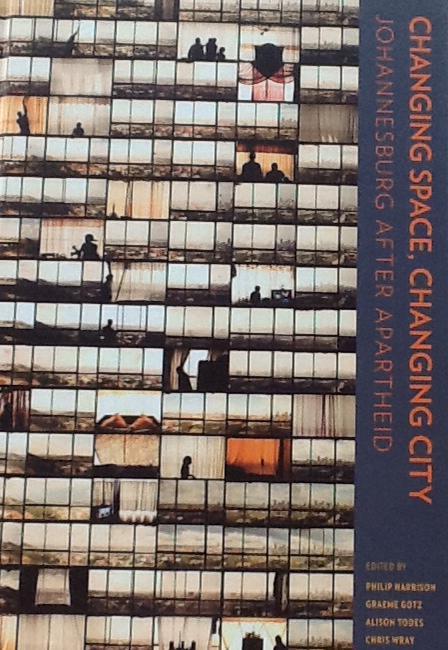Changing Space, Changing City, Johannesburg after Apartheid edited by Philip Harrison, Graeme Gotz, Alison Todes and Chris Wray. 2014, Wits University Press. Johannesburg is a city of vast expanse and substance. Within its short history it has become that the economic powerhouse of the subcontinent. It is a city that is changing rapidly and this book seeks to document what is happening right now and to place that change in a time context. How has the city fared since 1994? Over 40 academics, urban planners, urban analysts and policy makers have contributed to this major study which has been four years in the making. Johannesburg has become a revitalized magnet for migrants and immigrants and the much enlarged city is having stresses and strains across its complex infrastructure and services. These 34 essays draw together serious research on the physical form of the changing city across a diverse range of topics mainly from sociological , planning and geographical perspectives.
The book has been structured around three over-arching themes - macro trends (themes such as broad changes in housing, transport, poverty, urban spaces), area based transformations (empirical case studies of the inner city, Yeoville, Soweto, Kliptown, Sandton, the northern suburbs) and spatial identities (covering the ethnic identities of communities of the city - Somali, Ethiopian , Chinese etc and the struggle for survival if you face eviction, are a recycler or are an informal trader).
Together these essays offer a rich and textured intellectually challenging tapestry of the dynamic changes in the city over two decades. It's a picture of fluidity, flux, permanence, impermanence, adaptation, transformations and shifts to new spaces and places. There are sharp contrasts between old and new, wealth and poverty, the functioning and failed services of city management, inner city decay and new regional business hubs, immigrant and rooted Jozi types, north and south, planned suburbs and unplanned informal settlements, urban decay and successful regeneration, Johannesburg has it all.
50 plus coloured plates illustrating the key features in the cartography of the city provide a visual context for trends and changes. More tables, graphs, maps, aerial photographs and figures are liberally sprinkled through the text and add weighty evidence. With detailed bibliographies and careful notes for each chapter this book is a landmark investigation of the modern mixed metropolis that is Johannesburg. Although Johannesburg is a difficult place to live in, whether you are rich or poor, and has become even more difficult to manage and run, the message is an optimistic one. It is only through research, analysis and critical thought that the hope of turning the city into a world class African city will be realized. The best brains in the institutes, metropolitan government and universities of Gauteng are hard at work.
This book may have the appearance of a university textbook but it is so much more. It is a must for anyone who lives in Johannesburg and is trying to understand the place and the speed of change around us. It is also an essential book to add to a book collection on Johannesburg alongside a book such as John Maud's City Government (1938).
If you are interested in heritage and preserving the past, this book will enable you to find planning anchors in the present. It is the best book on Johannesburg since Clive Chipkin's Johannesburg Transition (2010).
2015 Guide Price: R650 (Available from Wits University Press)
Kathy Munro is an Honorary Associate Professor in the School of Architecture and Planning at the University of the Witwatersrand. She enjoyed a long career as an academic and in management at Wits University. She trained as an economic historian. She is an enthusiastic book person and has built her own somewhat eclectic book collection over 40 years. Her interests cover Africana, Johannesburg history, history, art history, travel, business and banking histories. She researches and writes on historical architecture and heritage matters. She is a member of the Board of the Johannesburg Heritage Foundation and is a docent at the Wits Arts Museum. She is currently working on a couple of projects on Johannesburg architects and is researching South African architects, war cemeteries and memorials. Kathy is a member of the online book community the Library thing and recommends this cataloging website and worldwide network as a book lover's haven.

